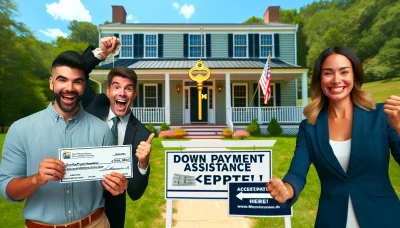Forms & Contracts for Real Estate Transactions Quiz
Test Your Knowledge
Question of
Understanding Real Estate Contracts
Essential Components of a Real Estate Contract
Get ready to dive into the core of real estate deals! A real estate contract is not just a piece of paper; it's the backbone of property transactions! First and foremost, identifying the parties involved is crucial. This isn't just about names; it's about ensuring that all participants are legally recognized entities capable of entering into a contract. Next up, we're talking about pinpointing the property in question with laser precision this includes legal descriptions that leave no room for doubt!
Now, let's talk about terms and conditions the heart of any real estate contract. These aren't just bland stipulations; they are the rules of engagement that dictate how the transaction unfolds. We're talking deadlines, prices, contingencies all spelled out with crystal-clear clarity to avoid any misunderstandings. And don't forget about rights and responsibilities! Each party has their own set of obligations, from maintaining the property to securing financing, and these need to be outlined with absolute certainty.
This is where things get exciting! Every clause, every provision injects confidence into your transaction. You'll know exactly what you're getting into, and so will the other party. It's like having a roadmap for success in your hands follow it closely, and you'll navigate through the complexities of real estate like a pro!
Identifying Parties and Property
- Buyer and Seller Information: Full legal names and contact details.
- Legal Description of Property: A detailed description that uniquely identifies the property.
- Title Verification: Ensuring clear title transfer from seller to buyer.
Defining Terms and Conditions
- Purchase Price and Deposit Details: Total amount and initial earnest money requirements.
- Closing Dates: Specific timelines for each stage of the transaction.
- Contingencies: Conditions that must be met for the contract to remain valid.
Outlining Rights and Responsibilities
- Maintenance Obligations: Who takes care of what until closing?
- Inspection Rights: Buyer's ability to inspect the property before finalizing the deal.
- Closing Costs Allocation: How fees associated with closing are divided between parties.
Common Types of Real Estate Contracts
A world of possibilities awaits in real estate contracts! Each type serves a unique purpose in property transactions. Purchase agreements are like treasure maps leading buyers and sellers to successful sales. They set out terms for transferring ownership think of them as blueprints for your property dreams! Lease agreements, on the other hand, are keys to unlocking rental opportunities. They outline tenant-landlord relationships with precision, ensuring everyone knows their role in maintaining harmony.
The power of attorney in real estate is like having a superhero on your team! It empowers individuals to act on behalf of others in property matters whether its signing documents or making decisions, this document ensures that your interests are represented even when you can't be there physically. Imagine having an ace up your sleeve that's what a well-crafted power of attorney can be in your real estate endeavors!
This is vital information!
Purchase Agreements
- Detailed Property Descriptions: Paints a picture of what's being bought or sold.
- Sale Price and Terms: The financial blueprint for your property acquisition or disposition.
- Closing Procedures: Choreographing each step towards finalizing the deal.
Lease Agreements
- Rental Period Terms: Duration and renewal options clearly defined.
- Rent Amounts and Due Dates: Financial commitments laid out with no ambiguity.
- Tenant and Landlord Duties: Roles distributed like a well-oiled machine for smooth operations.
Power of Attorney
- Limited or General Powers? : Tailoring authority levels to suit specific needs.
- Durable Power Considerations: Ensuring representation even if incapacitation occurs.
- Critical Role in Transactions: A fail-safe mechanism when personal attendance isnt possible.
In conclusion, understanding Forms & Contracts for Real Estate Transactions is essential for anyone looking to navigate this complex field successfully. Whether you're drafting a purchase agreement or granting power of attorney, each document plays a pivotal role in safeguarding interests and ensuring smooth transactions. Now is the time to take action! Equip yourself with knowledge, seek professional advice when needed, and step confidently into your next real estate adventure!
Navigating Residential Purchase Agreements
Are you ready to dive into the world of real estate transactions? Buckle up, because we're about to embark on a thrilling journey through the twists and turns of residential purchase agreements! This is where the magic happens, folks where dreams of home ownership start to take shape. But beware, it's also a realm filled with intricate clauses and legal jargon that can trip up even the savviest of buyers.
Let's break it down together and make sense of these crucial documents. With the right knowledge and a keen eye for detail, you'll navigate these contracts like a pro! Remember, understanding your real estate forms and contracts is not just important it's absolutely essential for a smooth and successful transaction!
Key Clauses in Residential Contracts
Contingency Provisions are like your safety net when buying a home. They are absolutely non-negotiable if you want to protect yourself from unforeseen events. Think of them as your personal team of superheroes, guarding against potential deal-breakers such as loan failures or pesky hidden defects that could derail your purchase!
Disclosure Requirements are the tell-all chapters of your real estate story. Sellers must come clean about the property's condition, revealing any issues that could affect its value or your enjoyment. It's like getting the full backstory on your future home no surprises, no secrets, just pure transparency.
- Closing Terms and Costs: Understand who pays what and when.
- Title Insurance: Ensures clear property ownership.
- Home Warranty: Protection against unexpected repairs.
Avoiding Pitfalls in Home Buying Contracts
The path to homeownership is fraught with potential pitfalls, but fear not! We're here to shine a light on those hidden traps. First up: Inspection and Appraisal Issues . Don't let them catch you off guard! Ensure your contract gives you the leeway to negotiate or walk away if the home doesn't pass muster on inspection or appraise at the right value.
Financing Contingencies are your escape hatch should your loan approval hit a snag. Embed this clause into your agreement to avoid being legally bound to purchase without the necessary funds. And let's talk about Legal Compliance and Dispute Resolution . This isn't just dry legalese; it's your roadmap for navigating any legal bumps in the road and resolving disputes without losing your shirt or your sanity!
Crafting Effective Lease Agreements
Components of a Strong Lease Contract
Attention all real estate enthusiasts! A robust lease agreement is the bedrock of a successful landlord-tenant relationship. It's not just a piece of paper; it's a binding promise, a set of rules that governs the rental experience. And let me tell you, crafting an ironclad lease contract is like building a fortress around your investment absolutely essential!
First off, every clause in your lease needs to be crystal clear. We're talking about the kind of clarity that leaves no room for doubt or interpretation. Your lease should outline the responsibilities and rights of both parties think of it as the ultimate guidebook for your rental property. And remember, this isn't just about following the law; it's about setting the stage for a harmonious landlord-tenant symphony!
Now, lets break down these components:
Tenant and Landlord Obligations
Here's where you get down to brass tacks. Spell out what you expect from your tenants and what they can expect from you. This section is non-negotiable! You want to cover everything from who shovels the snow to who handles emergency repairs at 2 AM. Make it unambiguous, make it fair, and most importantly, make it legally sound!
Rent, Security Deposits, and Fees
This is where things get real we're talking money! Your lease must detail when rent is due, how much is due, and what happens if it's late (because let's face it, sometimes life happens). But wait there's more! Don't forget about security deposits and any additional fees. Be transparent with your terms and watch your tenants nod in agreement because they know exactly where their hard-earned cash is going.
Maintenance and Repair Terms
Last but certainly not least, maintenance and repair terms are your safety net. They ensure that your property stays in tip-top shape and that everyone knows who fixes what. Whether it's a leaky faucet or a broken window have a plan in place. This isn't just practical; it's smart business!
Special Considerations for Rental Properties
Alright folks, let's dive into the nitty-gritty details that can make or break your rental game! Special considerations are like the secret sauce to your lease agreement they add that extra flavor that distinguishes an average contract from an outstanding one.
Think about this: each property is unique, each tenant has their own needs, and laws vary by location. So don't settle for a one-size-fits-all approach. Customize! Adapt! Innovate! Your lease should be as unique as your property, tailored to fit like a glove.
-
Subletting and Assignment Rules
-
Pet Policies and Restrictions
-
Termination and Renewal Options
In the realm of subletting and assignment rules tread carefully. This is sensitive territory that requires foresight. Clearly define whats allowed under your watchful eye. Are tenants allowed to sublet? Under what conditions? Set boundaries now or risk walking into chaos later!
Pet policies are another hot topic after all, pets are family too! Decide whether you're opening the doors to furry friends and under what terms. This isn't just about preferences; its about protecting your property while being considerate of pet-loving tenants.
Moving on to termination and renewal options talk about critical! You need to lay out how this rental ride can come to an end or continue cruising down Easy Street. Whether its notice periods or renewal conditions, clarity here prevents headaches down the road.
Utilizing Addenda and Amendments
Importance of Addenda in Real Estate Deals
Imagine sealing the deal on a property transaction , only to realize there's something unique about the property that isn't covered in the standard contract. That's where addenda come into play! Addenda are pivotal in customizing real estate agreements to fit the specific needs of both buyers and sellers. They provide a tailored approach to ensure that every aspect of the deal is transparent and agreed upon.
Addenda shine when it comes to addressing unique property features that aren't typically included in a standard contract. Whether it's an unusual easement, a special fixture, or an unconventional use of space, addenda make sure these characteristics are explicitly outlined. This prevents future disputes and creates a clear understanding between parties.
One more thingclarifying ambiguities ! If there's ever any confusion within the main contract, addenda act as a beacon of clarity. They can elaborate on complex clauses, specify exceptions, or detail any contingencies that are crucial to the real estate transaction. With addenda, you're not just signing a contract; you're crafting a comprehensive agreement that leaves no stone unturned!
Amending Contracts Post-Signature
Now let's talk about amending contracts post-signaturebecause lets face it, change is inevitable! When the terms of your real estate deal evolve after signing, amendments are your superheroes. They swoop in to handle changes in terms with precision and care. Whether its due to financial adjustments, timeline shifts, or any other alteration, amendments ensure that all parties remain on the same page.
Documenting agreement modifications is not just smartit's essential! Amendments provide a written record of any changes agreed upon after the original contract was signed. This documentation is key to maintaining transparency and trust between parties involved in the transaction. It's like updating your GPS route in real-time to avoid any roadblocks on your journey to closing!
Last but definitely not least, ensuring legal validity of amendments is critical. An amendment without proper execution might as well be just another piece of paper! To maintain the enforceability of your real estate contract, amendments must be drafted with precision, executed correctly by all parties involved, and ideally reviewed by legal professionals. This way, you safeguard your transaction against potential legal challengeskeeping everything above board and bulletproof!
- Addenda are essential for tailoring real estate contracts to specific scenarios.
- Unique property features? No problem! Addenda have got you covered.
- Ambiguities? Clarify them with addenda for smooth sailing.
- Post-signature changes? Amendments are your go-to solution.
- Maintaining legal validity with amendments is non-negotiable for secure transactions.
Legal Implications of Real Estate Documents
Understanding Contractual Obligations
Grasp the gravity of real estate contracts! These documents are not just mere formalities; they are legally binding agreements that set the stage for one of the most significant transactions in a person's life. Whether you're dealing with purchase agreements, lease contracts, or mortgage forms, each has its own set of terms and conditions that must be meticulously understood and adhered to. Ignorance is not bliss in this scenario; it's a potential legal pitfall!
Real estate transactions are steeped in legal formalities, and every clause counts. From earnest money provisions to contingency clauses, these contracts outline the rights and responsibilities of each party. And let's not forget about disclosure requirements! They're crucial for transparency and can have serious implications if neglected. This is where expert guidance becomes invaluable ensuring that you're fully aware of what you're signing up for!
Binding Nature of Real Estate Contracts
The binding nature of real estate contracts is non-negotiable! Once the ink dries on that agreement, parties are locked into a commitment that can only be altered through mutual consent or specific legal exceptions. Think of it as a promise carved in stone breaking it isn't an option without facing the consequences. It's essential to understand every word before making your mark, because once you do, there's no turning back.
Remember, these contracts aren't just suggestions; they're enforceable promises backed by law. They dictate the transfer of property ownership, leasing terms, and even outline how disputes should be resolved. Overlooking any aspect can lead to a cascade of legal issues. So energize your focus when reviewing these documents your future self will thank you!
Consequences of Breach of Contract
Beware the breach! Veering away from contractual commitments in real estate isn't just frowned upon; it invites a whirlwind of legal repercussions. If one party fails to uphold their end of the bargain, they could be staring down the barrel of costly litigation or financial penalties. It's not merely about losing a deposit; it's about maintaining your reputation and avoiding the stress and expense of legal battles.
The fallout from breaching a contract can ripple out to affect credit scores, future borrowing power, and even professional relationships. Don't let this happen! Understand what constitutes a breach and take proactive steps to comply with every term agreed upon. It's not just smart; it's critical for safeguarding your interests in the high-stakes world of real estate.
Remedies and Legal Recourse
If things go south in a real estate transaction, all is not lost! There are remedies at hand specific performance demands, monetary damages, or even rescission of the contract might be on the table. The key is swift action and informed decisions. Legal recourse is your safety net when contractual obligations go unmet.
Leverage this knowledge! Having an adept understanding of available legal remedies empowers you to navigate choppy waters should disputes arise. Consult with seasoned professionals who can guide you through this labyrinthine process their expertise could be your lifeline!
Regulatory Compliance in Real Estate Transactions
Navigate the regulatory maze like a pro! Real estate transactions are governed by an intricate web of state and federal laws designed to ensure fairness and legality in property dealings. From disclosures to anti-discrimination statutes, compliance isn't optional it's mandatory! Its about protecting stakeholders and maintaining market integrity.
- Title Insurance: Dont overlook this! Protect yourself against past defects in title transfers.
- Closing Disclosures: Absolute clarity on settlement costs is required by law no surprises allowed!
- Eco-Friendly Regulations: Stay ahead by understanding green regulations impacting property features or improvements.
The stakes are high, but so is your capacity for due diligence! Immerse yourself in understanding these laws to ensure seamless transactions that stand up to scrutiny.
Adhering to State and Federal Laws
Vital Alert: Adherence to state and federal laws is non-negotiable! Each state has its own unique set of rules governing real estate transactions from escrow requirements to property disclosures while federal laws address broader issues like lending practices (think RESPA) and interstate land sales (hello, ILSFDA!). To navigate this landscape successfully requires vigilance and an unwavering commitment to compliance.
Dive deep into these regulations! Equip yourself with knowledge about lead-based paint disclosures for older homes or how TILA affects financing terms disclosure. This isn't just about ticking boxes; its about conducting ethically sound business practices that protect all parties involved.
Navigating Zoning and Land Use Regulations
Zoning laws? Land use regulations? Yes, they matter immensely! These local ordinances dictate what can be built where, affecting everything from property value to community development. Understanding these rules is paramount for anyone involved in real estate development or investment.
This isnt just red tape; its about shaping our communities responsibly while maximizing investment potential. Get savvy on variances, conditional use permits, and rezoning processes this knowledge could make or break your real estate endeavors!
Ensuring Fair Housing Act Compliance
The Fair Housing Act isnt just another regulation; its a cornerstone ethical principle ensuring equal access to housing regardless of race, color, national origin, religion, sex, familial status or disability. Compliance here isnt just good practiceits good humanity! Be vigilant against discrimination; champion diversity and inclusivity in all your real estate transactions.
Incorporate fair housing principles into every facet of your business modelthis goes beyond mere compliance; it reflects integrity and respect for individual dignity within our communities. Lets celebrate diversity as we build foundationsboth literal and metaphoricalthat last generations!
Closing the Deal: Finalizing Real Estate Transactions
Preparing for the Closing Process
Get ready to cross the finish line in your real estate journey! The closing process is the thrilling final step in securing your new property. But before you pop the champagne, there's a checklist to tackle to ensure everything goes smoothly. It's time to be proactive and meticulous; after all, this is one of the most significant transactions you'll ever make!
First up, you've got to prepare for the big day! This means getting all your ducks in a row - from ensuring your financing is locked down to reviewing every single document that will need your signature. You're not just buying a house; you're making a monumental investment. And with great investments come great responsibilities like making sure there are no last-minute surprises that could derail your dreams.
Conducting Final Walkthroughs
The final walkthrough is not just a formality; it's your last chance to verify that everything is exactly as agreed upon before taking ownership. It's about more than just admiring your future abode; it's an inspection mission! You must be vigilant, checking for any discrepancies or issues that could throw a wrench into your closing plans. Don't leave anything to chance!
Remember, this is where you ensure that all repairs have been completed and that the property's condition hasn't changed since you last saw it. If something isn't up to snuff, now's the time to speak up! Your future self will thank you for being so thorough.
Reviewing Closing Documents
This is where things get real! Reviewing closing documents can feel like navigating a maze of legal jargon and financial figures. But fear not! With careful attention and possibly the help of a trusted professional, you can understand every term, condition, and cost outlined in these papers. This isn't just paperwork; it's the blueprint of your purchase. Miss nothing!
- Sales Contract
- Title and Deed Documents
- Mortgage Agreement
- Closing Disclosure (CD)
- Transfer Tax Declarations
Dive into each document with eagle eyes scrutinize every detail! These papers dictate your obligations and rights as the new property owner. Understanding them inside out is not optional; it's imperative for a successful transaction.
Arranging Payment and Financing
The moment has come to secure the funds! Whether its transferring large sums for a cash purchase or finalizing mortgage details with lenders, arranging payment and financing is a critical step that requires precision and timing. This isn't just about writing checks; it's about ensuring every penny is accounted for and transferred correctly.
You need to be on top of every aspect - from down payments to closing costs. There should be no surprises when it comes to money on closing day. Be prepared, be punctual with payments, and watch as the keys to your new property become yours!
Post-Closing Considerations
Congratulations! The ink is dry on the paperwork, but hold on theres still work to do even after closing! Nows not the time to drop the ball; post-closing considerations are crucial for cementing your ownership and avoiding future headaches.
You've got this far by being diligent, so keep up that momentum! Post-closing might seem less exciting, but its filled with important tasks that protect your investment long-term.
Recording the Deed and Title Transfer
This is non-negotiable recording the deed and title transfer officially marks you as the new owner in public records! Its essential for establishing legal ownership and protecting against future claims. Dont even think about skipping this step; its what seals the deal legally and formally.
The moment those documents are recorded at the local county recorder's office or courthouse, breathe easy knowing that youve crossed another crucial milestone in home ownership. This isnt just bureaucracy; its assurance that everyone recognizes YOU as the rightful owner.
Handling Post-Closing Adjustments and Escrows
The devil is in the details, especially when it comes to post-closing adjustments like prorated property taxes or homeowner association fees. Overlook these adjustments at your peril because they can affect your finances if ignored.
Your escrow account might also need attention post-closing managing funds for insurance premiums or property taxes ensures that these critical payments are never missed. Stay vigilant with escrow accounts; theyre there to keep you financially secure regarding property expenses.
Maintaining Records for Future Reference
Last but certainly not least maintain meticulous records of all documents related to your real estate transaction. This isnt just filing away paperwork; its safeguarding proof of ownership, agreements made, warranties provided everything!
Your future self will thank you when it comes time to refinance, sell, or address any issues related to your property. Keep those records organized and accessible theyre goldmines of information that serve as irrefutable evidence of your rights as a homeowner.












